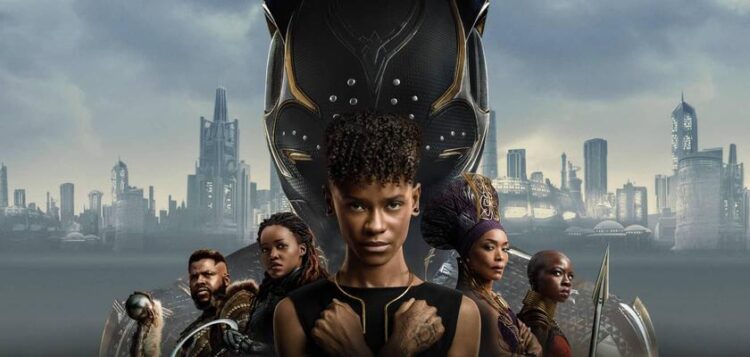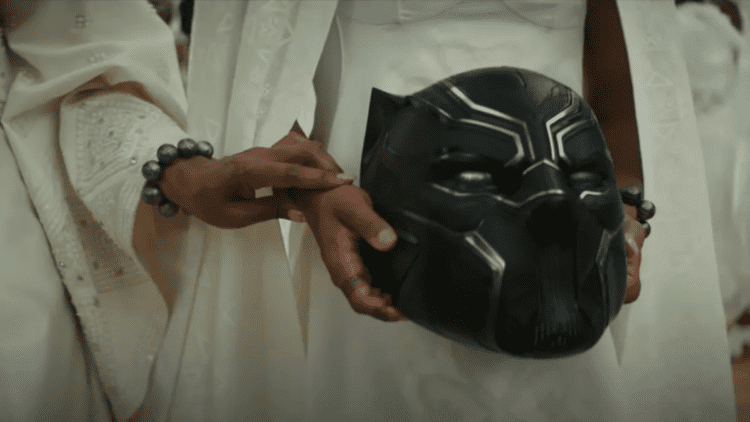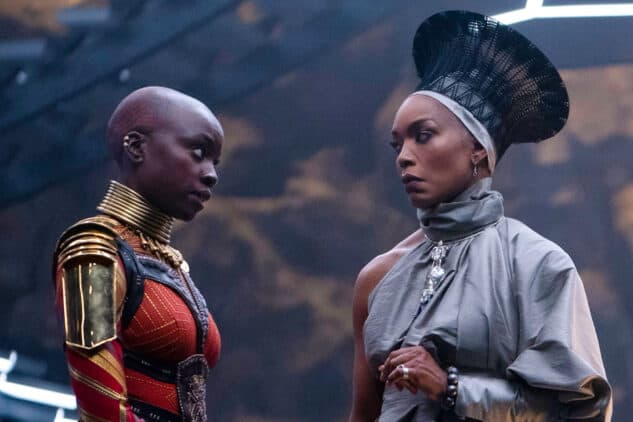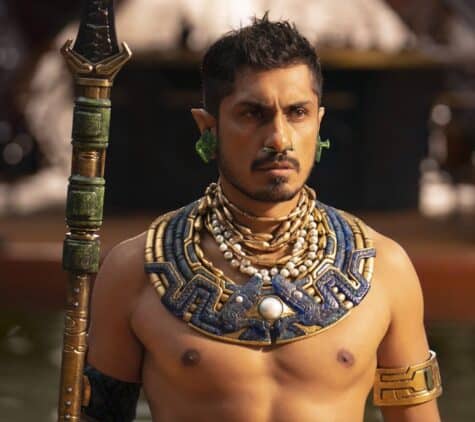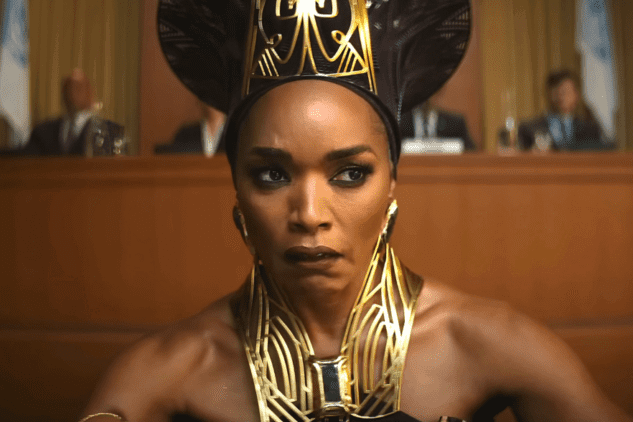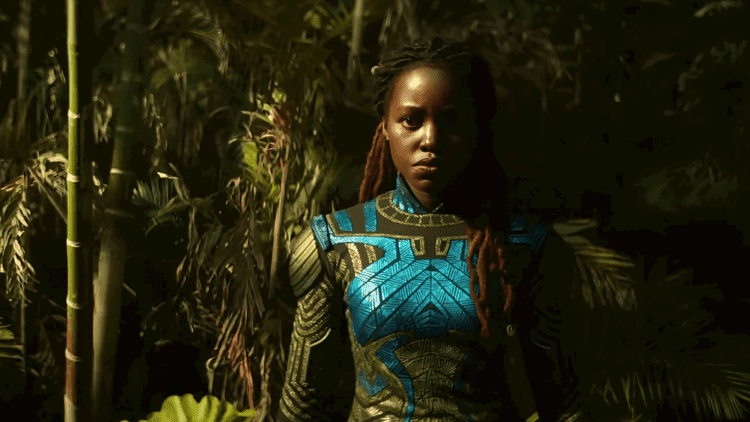I apologize for the lateness of this review. I could not watch this film on its opening weekend due to work, and when I got back, I wanted to watch it with my family. But I finally got to see the movie over the weekend, and I hope this ‘Black Panther Wakanda Forever’ Review will showcase my appreciation for this emotional film.
Truly, this movie exists how it does because of the loss of Chadwick Boseman. And I must say right now that the movie handled his death “in canon” beautifully. Not only did they tie it into the storylines of Shuri, Queen Ramonda, and others, but you could feel the pain and passion that was put into key scenes as the characters, alongside the actors, dealing with the loss of Chadwick/T’Challa. In fact, his death is the opening of the movie. We never see him, but his presence is there, including in the “opening credits” sequence that I totally cried during—the first of many tears in this film.
From the “prayer” scene to the funeral and the final scene before the credits, the main crux of the story was about Shuri overcoming her grief over the loss of her brother. If you haven’t heard/seen by now, she has become the next Black Panther. But her journey to that point and getting to the place she needed to be with it was anything but basic. That was yet another thing I appreciated.
It may seem odd to hear that a Marvel Cinematic Universe film focused on the “grieving process” and how everyone handles it differently, but that’s the thing, comics deal with that a lot. Both Marvel and DC Comics have shown many issues of characters mourning the loss of friends, family, and allies. We just don’t think of it happening on this scale in a superhero movie because of the “feel” that these movies like to give off. For Shuri, her grieving process made her introverted and distant from the beliefs of her mother and brother.
Queen Ramonda, on the other hand, has to be the queen, and as we find out, post-snap and post-T’Challa speech at the UN, people don’t like the idea of Wakanda hoarding Vibranium. Given all that’s happened within the universe, and outside of it, it’s easy to forget what T’Challa said at the end of the first movie. About his “building bridges” and helping better the world. Naturally, the US and other forces see this “promise” differently and are even taking action against Wakanda to try and get Vibranium, even threatening “offensive action” against them at one point.
That threat led to one of my favorite scenes. Where Ramonda shows off the power and skill of the Dora Milaje and her willingness to be diplomatic despite everyone else not giving her that courtesy. As many would agree before things heated up like they did, no one but the Wakandans should have Vibranium because Wakanda knows how to show restraint. Other world leaders? Not so much.
A perfect segue to talk about Namor and his people. Namor had been long-rumored for the film, but how the movie tackles him is different than the comics. His origins and place of birth are different, but the feel is the same. He even says he’s a Mutant, a sign of things to come. I, at first, was surprised by the Meso-American influences on him and his people. But by the end of the movie, I loved it. They went all in on the notion, and from the designs of the people’s clothes, the music, etc., they made you understand why this version of Namor is just as valid as the comic version.
José Tenoch Huerta Mejía did a solid job as Namor. He brought weight to Namor and his feathered feet, yet made it clear that he’s a more balanced individual than some would give him credit for. He’s a painter and a great leader. He’s funny yet menacing, powerful, and willing to go to the ends of the Earth to complete his mission so long as his people are safe. He understands the world despite being under its oceans for a long time. His scenes with Shuri and Ramonda were powerful as they showed off his many sides, even when he was destroying Wakanda at one point.
Another welcome addition was Dominique Thorne as Riri Williams, aka Ironheart. She had a sassiness and “what is going on?” feel to her that you couldn’t help but resonate with. She didn’t expect to be put into this situation, but she was in it and adjusted accordingly. We know she’s getting a Disney+ series, and hopefully, they will do her justice there, too, because Riri is a great character. Oh, and I hope we also get more time with her and Shuri. They make a great duo.
One thing I must note in my review is the film’s music. Between the themes for Wakanda, “Atlantis,” and other beats, including Rihanna’s “Lift Me Up” at the end, there was so much to enjoy. Marvel movies don’t always get praise for the soundtrack outside of Guardians of the Galaxy, but I’d put this soundtrack up with it.
Now, if you’re wondering about the “comedy aspect” of the film because of my thoughts on Thor Love and Thunder, put your mind at ease. Pretty much all the comedy here feels earned and is honestly funny. The first film was this way too. It had comedy, but didn’t betray the characters to make it happen.
In fact, I loved all the dramatic and thematic ties to the first movie. M’Baku, for example, stood out because of the wisdom he had gained between the two movies. He was still a brute at times, but it was necessary. Hearing him give counsel to Shuri was great, and I look forward to seeing what they do with him going forward, given his…new station. He’s just one of many references to the previous film and beyond, including the return of Everett Ross and “Director Fontaine.” More on her later.
Arguably the biggest thing I appreciated was the path of Shuri becoming Black Panther. She shunned the idea of another Black Panther before because of technology and the loss of her brother. Then, when presented the opportunity to become the Black Panther, an expected (and freaking legendary) cameo changed the game for her. She didn’t want the mantle for pride or for Wakanda. She wanted revenge for what Namor had done. That was it, and they stuck with that for a while instead of doing an immediate about-face.
Why that’s good is that it further shows the stages of grief. Shuri had already been in denial, bargaining, and more. Her initially becoming the panther and throwing her weight around as princess to ensure that Namor died was her in the anger phase, and it worked.
Before I get to the ending, I do want to point out the action. The movie did a great job making Namor’s people and their technology feel powerful and threatening. From their underwater abilities to their own use of Vibranium (and I liked the explanation for why they had it) to Namor’s abilities, to the water bombs, etc. They are a threat to the world, and the world better hope they don’t tick off Namor, as Shuri and Ramonda did.
In regards to the ending, I wasn’t expecting it to go like that, both with the final scene and the mid-credits sequence. It’s a testament to Ryan Coogler and his team for honoring Chadwick Boseman/T’Challa, even when world-ending events occur. Again, this was a film about grief and moving on from loss. Seeing Shuri cry at the end as she FINALLY mourned her brother was powerful. Then, the reveal that Nakia had a child with T’Challa pre-snap and named him T’Challa was heartwrenching in the best way possible. This, no doubt, was a message to the fans that even though Chadwick/T’Challa is gone, his legacy and line live on.
That being said, it wouldn’t be a Black Panther Wakanda Forever Review without some critiques, and there are some fair ones to be had. First, like the previous movie, there were some pacing issues. It took a while to get to where it wanted to go. The build-up was necessary, but it wasn’t always worth it. Second, I didn’t like the treatment of Okoye here. While Angela Bassett’s speech in disowning her was powerful, the scene didn’t sit right with me. Moreover, Shuri doesn’t even talk about it until she needs Okoye again, which is odd because it’s her fault she went to Namor and literally left Okoye high and dry.
In terms of the final battle, while it was clever, the ending definitely felt odd. Shuri sparing Namor was great. But Namor’s people literally had the Wakanda’s at their mercy, and they stopped without a fuss. Yes, Namora did address it, but it was too easily waved off, and the “Shuri has no allies” line makes no sense because she’s basically an Avenger.
Arguably the biggest faux pas for me was “Director Fontaine.” I understand her being in the movie in part, and I’m glad they played her as a “Chessmaster,” but there was no payoff to it. Also, how did she bug Wakandan technology without Ross knowing? And those two being married? Yeah, that was unnecessary.
Finally, this really doesn’t feel like a movie you’d want to watch over and over again. That might sound like an odd thing to critique, especially given the subject matter, but it’s the truth from my point of view. This movie is very much a way for fans to mourn alongside the characters, but eventually, the time to mourn is done. So longevity here is a bit of an issue.
Even with those flaws, Black Panther Wakanda Forever was a powerful movie that showcased how beautiful the MCU can be when it’s allowed to be emotional and real. I don’t know where the characters will go next, but I’m looking forward to it.
Black Panther Wakanda Forever Review
Summary
Black Panther Wakanda Forever was a movie that needed to be made for people to mourn the loss of a great man and be able to move past it. Stirring performances fill this movie. While not everything works, it’s a must-watch for MCU fans.
-
Black Panther Wakanda Forever Review


